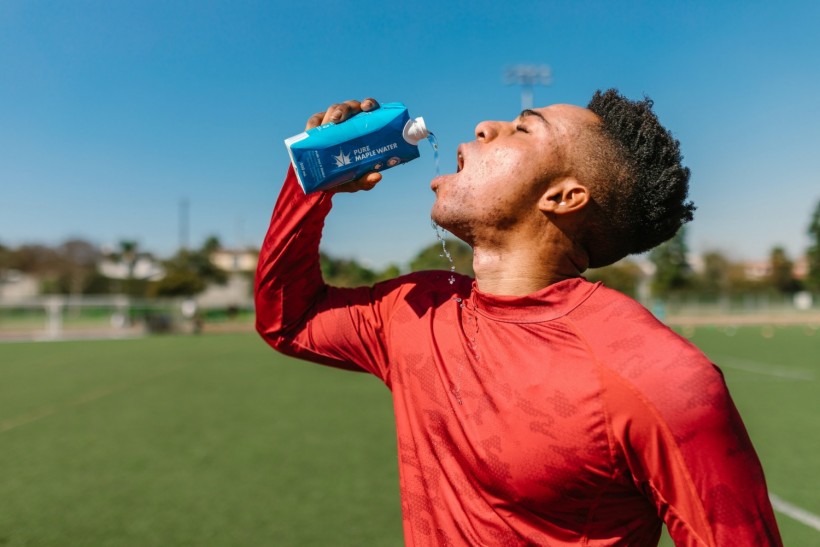Most athletes know the importance of being hydrated, but sometimes they may not be taking in enough fluids for proper hydration. Being hydrated not only boosts energy levels and promotes proper brain function, but it can also help you perform better in sports.
The quantity of fluid your body sheds is affected by various factors, including the intensity and duration of the workout and climate. Of course, when you exercise, you lose fluid - not just through sweating but also through the air you expel. Being dehydrated or losing 'too much' fluid can negatively impact your athletic performance.
You lose critical electrolytes like sodium and magnesium through sweat and the air you breathe when exercising. Although electrolytes do not contain energy, they are required to convey electrical impulses to nerves and muscles, including contraction and relaxation. As a result, muscle cramping may be caused by electrolyte loss and dehydration.
How do you know you are dehydrated?
Dehydration happens when your total body water content decreases owing to fluid loss, decreased fluid intake, or both-sweating when exercising is your body's technique of keeping its temperature stable. If water loss through sweat becomes more than fluid intake, dehydration will take control and cause your body temperature and heart rate to rise. This makes you feel sleepy or exhausted.
Dehydration symptoms can be so minor that athletes suffer from them without even realizing it. Dry lips and tongue, thirst, headache, lethargy, dry skin, muscle weakness, dark urine, and dizziness are all common symptoms of dehydration. Pay close attention to the signs your body is emitting. Early detection and treatment of dehydration are critical for remaining in the game.
Staying hydrated before, during, and after your workout ensures you have enough fluids to replace sweat and prevents dehydration issues, which occur when the quantity of water in your body goes below your normal, healthy level.
Importance of proper hydration for athletic performance
Did you know that not staying hydrated might cut your workout endurance in half? For example, if your endurance time is 100 minutes, dehydration can reduce it to 50 minutes. When the body is dehydrated, several things occur that have a direct influence on sports performance.
Dehydration causes a drop in blood volume, a decrease in skin blood flow, a reduction in perspiration rate, an increase in core temperature, and an increase in muscle glycogen usage. All of these circumstances have a detrimental influence on your capacity to perform at your peak.
Dehydration may have a severe influence not only on your physical performance but also on your mental game. Cognitive performance is equally vital as physical performance. Dehydration can cause delayed reaction times, weariness, and poor attention. The environment also influences hydration levels.
With high-performance athletes, limiting dehydration to no more than 2% body mass loss aids in maintaining your physiological, sensory, and safety aspects while also assisting in exercise recovery and future training sessions. Proper hydration goes a long way in recovery and getting you ready for the next game or practice.
How to hydrate
Fortunately, there are methods for ensuring appropriate hydration before, during, and after your activity. Yes, all three times are essential. To figure out how much water you need in a day, divide your weight in pounds by half and convert it to ounces daily. For instance, if you weigh 160 pounds, you will require 80 ounces of water.
A standard water bottle is about 16 ounces, so you'd need at least five bottles daily to stay hydrated. To remain ahead of the competition, use these strategies to design your hydration plan based on your particular needs.
How to hydrate before your workout or game
The idea is to be adequately hydrated before beginning any physical activity. Be sure to hydrate before your body tells you that you're thirsty. To avoid feeling thirsty, anticipate it and take a sip of water. Plan your activities a day ahead and hydrate adequately the night before to put yourself in a better position to succeed.
The quantity you should drink depends on your height, weight, body composition, activity level, and other factors, but many nutritionists recommend 16 to 20 fluid ounces four hours before exercise.
Another method to tell whether you're well hydrated is to check your urine. The urine color should be light yellow, similar to lemonade. You may be dehydrated if it is dark yellow or amber.
During your workout
To stay hydrated throughout your exercise, drink enough fluid to replace the water you lose when sweating while avoiding excessive bodily fluid loss and over-consumption of fluids.
The American Academy of Pediatrics suggests that athletes consume 34 - 50 ounces of water every hour. Every 15 to 20 minutes, drink 7 to 10 ounces (or 4 to 6 gulps), and considerably more often when humidity or temperature levels are high. Fifty ounces of water is almost equivalent to three disposable water bottles.
You need electrolyte replenishment for activities lasting more than 90 minutes. Having a sports drink from Tailwind Nutrition in addition to your water is beneficial and will help you keep hydrated.
Post-workout hydration
The purpose of post-workout hydration is to replenish any fluid deficit that occurs during your exercise. Replacing essential fluids after your workout or game will boost recovery, restore hydration, lessen hypo-hydration symptoms, and reduce post-exercise weariness.
In terms of how much you should hydrate after exercise, keep an eye on your body weight to see how much sweat you shed. If you dropped 1.5% of your body weight, you are OK and well hydrated. If the figure is more than 1.5%, you are dehydrated and should rehydrate as soon as possible.
Foods with high water content are a simple approach to keeping your body hydrated. Watermelon, coconut water, celery, cucumber, and other fresh fruits and vegetables can help keep your body hydrated and ready to go.
Hydration is frequently overlooked. Staying hydrated adds significant value and relevance to your body's everyday operations. Each athlete must check their hydration and take responsibility for developing a rehydration strategy. Staying hydrated allows you to train harder, practice longer, and perform better.
* This is a contributed article and this content does not necessarily represent the views of sciencetimes.com














![Venus Lost Water and Dried Out Due to Chemical Reaction HCO+ Dissociative Recombination [Study]](https://1721181113.rsc.cdn77.org/data/thumbs/full/53493/258/146/50/40/venus-lost-water-and-dried-out-due-to-chemical-reaction-hco-dissociative-recombination-study.jpeg)
